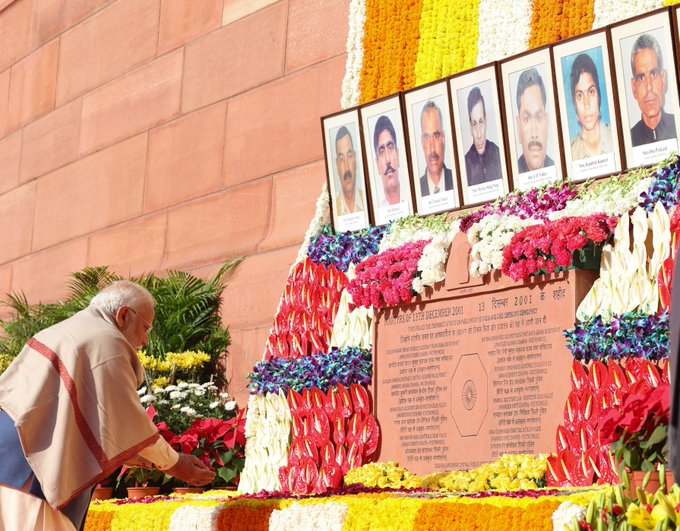President Droupadi Murmu on Friday paid a heartfelt tribute to the bravehearts who sacrificed their lives during the 2001 terrorist attack on the Indian Parliament.
In a message on X, she wrote: “I pay my humble tribute to the bravehearts who sacrificed their lives defending our Parliament on this day in 2001. Their courage and selfless service continue to inspire us. The nation remains deeply grateful to them and their families. On this day, I reiterate India’s unwavering resolve to combat terrorism. Our nation stands united against the forces of terror.”
Prime Minister Narendra Modi, along with several top political leaders and ministers, gathered at the Parliament to honour the fallen soldiers on the 23rd anniversary of the attack.
Among those present were Vice President Jagdeep Dhankhar, Lok Sabha Speaker Om Birla, Rajya Sabha Leader of Opposition Mallikarjun Kharge, Lok Sabha Leader of Opposition Rahul Gandhi, Union Home Minister Amit Shah, and Union Ministers JP Nadda and Kiren Rijiju. They paid floral tributes to the martyrs, acknowledging their supreme sacrifice.
Uttarakhand Chief Minister Pushkar Singh Dhami paid tribute as well, stating that the soldiers who laid down their lives in the attack would continue to inspire citizens to serve the nation.
In a post on X, Dhami said, “Salutes to the soldiers who sacrificed their lives in the terrorist attack on the democracy, the Indian Parliament. Your devotion to duty, indomitable courage, and supreme sacrifice are proof of your unwavering loyalty to the nation. Your tale of valour will always inspire us to serve the nation.”
The tributes brought back memories of the harrowing terrorist attack on India’s Parliament on December 13, 2001. That day, five Delhi Police personnel—Jagdish, Matbar, Kamlesh Kumari, Nanak Chand, and Rampal along with Om Prakash, Bijender Singh, Ghanshyam, and Deshraj, a CPWD gardener, made the ultimate sacrifice while defending the parliamentary complex from a terrorist assault.
The attack, carried out by members of Pakistan-based militant groups Lashkar-e-Taiba (LeT) and Jaish-e-Mohammed (JeM), left a deep mark on India’s history. The terrorists, who infiltrated the premises under the guise of a vehicle with fake Home Ministry and Parliament stickers, initiated a violent assault with weapons, including AK47 rifles, grenade launchers, and pistols. In the ensuing chaos, five terrorists were killed by Indian security personnel.
More than 100 people, including prominent politicians, were present inside the building at the time of the attack. The gunmen attempted to drive their vehicle into the car of the then Vice President Krishan Kant, who was inside Parliament. As the terrorists exited the vehicle and began shooting, the Vice President’s security personnel returned fire and managed to secure the premises, preventing a much larger disaster.
Indian security agencies later reported that the terrorists had been directed by Pakistan’s Inter-Services Intelligence (ISI), and the attack led to heightened tensions between India and Pakistan, triggering the 2001-2002 India-Pakistan standoff.
(With inputs from ANI)




















